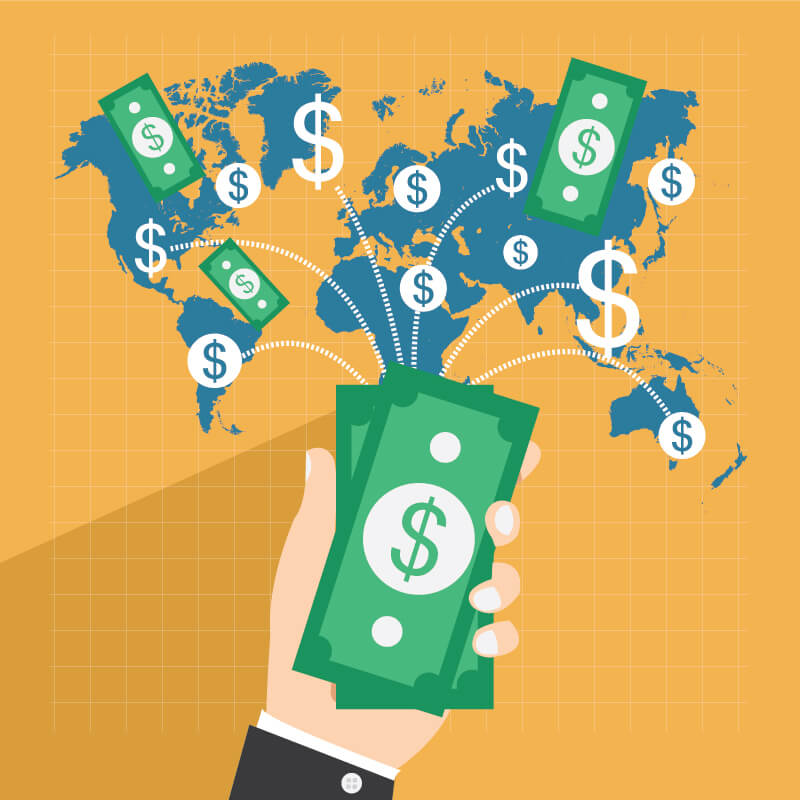Whether you’re buying property in the USA, making an investment in the UK or paying for a destination wedding in Greece, sending large sums of money in and out of Australia doesn’t come without considerations. Fees, exchange rates, legal requirements and tax regulations are just a few of these factors you’ll need to carefully evaluate before transferring your funds.
To help you make an informed transfer, we’ve compiled a guide on how you can transfer large sums of money in and out of Australia. We’ve also provided an overview of legal and tax requirements, and what you should look out for with exchange rates, fees and security.

Unfavourable exchange rates can put a big dent into the final amount of money that reaches your recipient – especially if it’s a large sum. The foreign exchange rate is the rate at which one currency will be exchanged for another foreign currency. These rates fluctuate depending on factors like market conditions, supply and demand, and political and economic factors.
You should always shop around for an international money transfer provider that offers competitive currency exchange rates and conversion fees, so you’re getting the most value for your transfer.
Keep in mind that international money transfers will incur upfront and hidden fees for both the sender and recipient, depending on the transfer service.
Some common fees for international money transfers include:
Different jurisdictions will often have additional information requirements and considerations when transferring funds from overseas accounts, so it pays to do your research first, or ask your provider about any specific requirements on transferring large sums of money overseas.
For example, any money transfers to Vietnam will require the passport or citizen card number of the beneficiary, and in China, recipients cannot receive a personal payment relating to trade. You will also need an IBAN (a code that identifies a customer’s bank account) for money transfers to most European countries.
When sending large amounts of money overseas, security is probably one of the most important considerations; you want to make sure the funds are transferred safely and without hassle. Luckily, Australia is one of the most highly-regulated countries in the world for international money transfers.
If you want to make sure your money is going into safe hands, check that your bank or international money transfer provider has the following before you send your funds:

To help reduce the risk of money laundering or terrorist financing activities through our banking system, banks and other money transfer companies are required by law to report any cash transactions exceeding AUD$10,000 (or foreign equivalent) to the Australian Transaction Reports and Analysis Centre (AUSTRAC). This is known as a threshold transaction report.
As per the Anti-Money Laundering and Counter-Terrorism Financing Act 2006, some of your personal and bank details may be collected by AUSTRAC and other state agencies, as well as the financial details of the recipient (including SWIFT code) or any business information, including an Australian Business Number (ABN) if you’re transferring funds on behalf of a company. Travellers bringing more than AUD$10,000 in cash into Australia from overseas will have to declare it to customs. This may also include cheques and money orders. Mailing or shipping an amount above this threshold will also need to be declared.
Whether or not you need to pay tax on money transferred from overseas will largely depend on the source of the funds (e.g. inheritance, gift or just as proceeds from the sale of a home). We break up a few of the non-taxable and taxable sums of money below:
Inheritance
If you inherit money from abroad, you won’t typically need to pay any additional tax unless specified by the executor (the person administering the estate). However, any earnings or income that is derived from your inheritance (e.g. if you have invested this money) will be taxable.
One-time cash gifts
Cash gifts, like cash birthday presents, are generally exempt from Australia’s gift tax. However, gifts exceeding AUD$10,000 received as part of a business-like activity or relating to your income-earning activities (e.g. money earned from contract work) may be taxable.
Savings you bring into Australia when you migrate
If you’re migrating to Australia, you generally won’t need to pay tax on any savings you’re bringing into the country. In many cases, you would have already paid tax on the savings you bring to Australia if you’ve accrued these savings from your employment overseas.
To save you from paying taxes twice on your savings, Australia has several double taxation treaties in place with various jurisdictions around the world.
Footnote: International taxation is a complex and challenging area of taxation law. This is not legal advice on your taxation obligations. This is general advice only. You must always consult your taxation specialist for advice on your particular financial position.
You may need to pay tax on:
Pensions or superannuation
Most Australian residents are required to pay tax on their foreign pensions and superannuation, even if a tax has already been withheld by the country where the payment originated. You may be entitled to deduct some personal contributions made to your pension or annuity income.
You may also be eligible for a foreign income tax offset if your foreign pension or annuity has been taxed both in Australia and overseas. Generally, pensions and superannuation payments are taxable only in the recipient’s country of residence. So, if your payment has been taxed in a country with which Australia has a tax treaty, you may get an offset on that tax you pay in the foreign country against the tax you pay in Australia.
Properties
As an Australian resident, you must pay tax on any income or capital gains you make from the rental or sale of properties overseas. You will need to declare property income or capital gains in your Australian tax return, but if you have already paid a foreign tax on that income or gain, you may be eligible for a foreign income tax offset.
Offshore bank accounts
The interest your offshore bank account accrues is taxable if you’re a permanent Australian resident. If you hold bank accounts overseas, you’ll be required to report any interest or other income you earn from these accounts in your Australian income tax return.
For more information on tax implications of receiving large amounts of money from overseas, you can visit the Australian Taxation Office (ATO) website.
Note: International taxation is a complex and challenging area of taxation law. This is not legal advice on your taxation obligations. This is general advice only. You must always consult your taxation specialist for advice on your particular financial position.

An international money transfer service allows you to send money to a bank account internationally. You’ll have to set up an online account with the international money transfer provider and provide both your own and the recipient’s bank details. Once you’ve completed this, you can then exchange your money into the desired currency. From here, your service provider will deposit these funds into the recipient’s bank account overseas.
International money transfer providers typically offer lower transaction fees and more competitive foreign exchange rates than banks.
You can transfer money electronically from your Australian bank account to another bank account overseas, using online or mobile banking, or by visiting a branch. You’ll need the recipient’s name and bank details, such as their BSB, account number and SWIFT or BIC code, to process the transfer.
Be aware that banks may charge higher transfer fees and uncompetitive currency exchange and conversion rates. However, the main benefit of bank transfers is that they can be completed quickly and conveniently from your bank account without having to sign up to anything.
You can request an international bank draft in your desired currency from a financial institution, using funds from your bank account to cover the amount of the cheque. You can then mail the cheque overseas to your recipient, who can cash it at a local bank, or deposit it straight into their bank account.
Bank drafts can be a cheaper alternative, as they can be made out in the local currency and don’t require a currency conversion from the recipient’s financial institution. However, bank drafts take weeks to process so may not be the best option if the payment is urgent.
Peer-to-peer money transfer providers essentially remove ‘the middle man’, so you’re not dealing with a bank or foreign exchange platform, but can be directly matched with buyers and sellers of different currencies to get a competitive exchange rate on your money transfer. This option typically offers fast processing times, better exchange rates and lower transfer fees than a bank. However, peer-to-peer money transfer providers don’t offer as many exotic currencies and transfer destinations as other services.
At the Compare the Market, we can save you time and money by comparing international money transfer providers to help you find the different exchanges rates and transaction fees with our free comparison tool. Try it out today – it only takes seconds to find great value for your next transfer.
The Currency Shop- Best way to transfer large sums of money internationally (2019).
Australian Taxation Office- Moving to Australia permanently (2019).